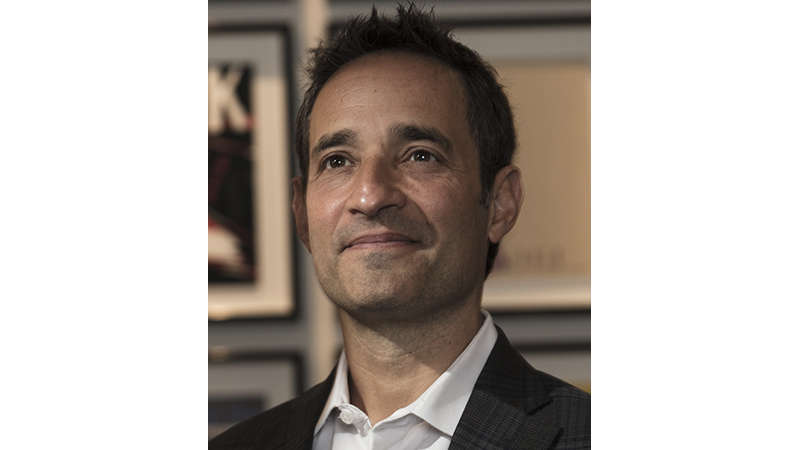Josh Linkner Explains How Little Breakthroughs Can Drive Big Innovation
Josh Linkner, author of “Big Little Breakthroughs: How Small Everyday Innovations Drive Oversized Results,” knows a fair amount about how creativity can propel a small company to make a quantum leap over bigger, slower competitors.
He spent over 1,000 hours interviewing entrepreneurs, billionaires, captains of industry, and award-winning innovators on the topic. But he also speaks from personal experience, having launched and sold five tech companies, hired 10,000 people, heard 3,000 startup pitches, served on over 80 corporate boards, and started a successful venture cap fund to invest in his hometown of Detroit. He also sidelines as a pro jazz guitarist.
"I learned to play piano at 8, which taught me the importance of practice, discipline, and delayed gratification in being creative," Linkner told Startup Savant. "I soon switched to guitar and in 1988 started my B.A. at the Berklee College of Music in Boston in 1988. I didn't graduate until 1994 at the University of Florida because I was a working musician and took a year off to start a tech company. But I feel I've earned a real-world MBA in creativity by playing jazz, since it teaches you how to work with others by combining the mastery of technique with improvisation, adapting to new ideas in real-time."
Harvard professor Stefan Thomke attributes 77% of economic growth to small creative advances, not radical innovations, he noted. "The number one skill that is in most demand and lacking in most job-seekers, according to human resource experts, is creative problem-solving with critical thinking," Linkner reported. "Creative skills can continue to give humans an edge over artificial intelligence."
The entrepreneurial bug bit him early, selling fireworks to kids at his school in 1981. It was successful, he said, in that no one lost fingers and he learned a bit about sales. More importantly, the same year, his dad bought him an Atari computer, which allowed him to start combining technology with creativity.
While friends were working on business degrees, Linkner started his first company at 20 in 1990, assembling mail-order parts into personal computers before they were easy to buy at retail, selling it in 1993. "He who learns the fastest wins" was his central lesson.
In 1995, he created a website developer when few businesses were online, selling it in 1999. Just before that, he had also launched ePrize, which was half an ad agency and half a software developer, and did a lot of promotions for the likes of Nike, Coca-Cola, and Procter & Gamble. He sold it in 2012 when it achieved $100 million in revenues.

The Art and Science of Business Creativity
Since 2007, Linkner has delivered more than 1,000 keynotes, mostly on how to stimulate more creativity in organizations that will produce meaningful results, such as better problem-solving to overcome obstacles. In 2011, he came out with his first book on the topic, “Disciplined Dreaming.”
He notes that neuroscientists have proved that the brain is not the fixed creature they once thought it was, so you were either smart or not due entirely to genetics. New technology has shown that it has neuroplasticity, the ability to adapt its structure and functions throughout life in response to experience. And creative potential expands with it. "Imagination is the raw material, creativity adds value, and that can result in something useful we call innovation," he explained.
No matter what our biological or mental disadvantages, our family and community backgrounds, or educational shortfalls, almost everyone underestimates her or his ability to come up with original ideas of value, according to Linkner. Regardless of background, there are lots of unusual ways for individuals to jumpstart their creative skills, including napping (which produced a 40% increase in one study) and a combination of breathing, self-talk, and visualization for five minutes a day (Linkner details his personal list).
The key steps to powering those big little breakthroughs Linkner calls "the obsessions of everyday innovators," including:
- Fall in love with the problem. A mountain may seem impossible to climb, but there can be hidden pathways that will take you gradually to the top if you look closely. Linkner cites Mako Medical, a startup that successfully challenged the prices of medical lab testing giants to top $200 million in sales in 2020.
- Start before you're ready. Jumping into the deep end is often the only way to find out if something works. One of Linkner's investments in hometown startups in Detroit, StockX, discovered that its original model wasn't working so it pivoted to become an online marketplace for collectible footwear, among other items. It achieved over $1 billion in sales, despite competing with the likes of eBay and Amazon, and recently raised venture funding at a $3.8 billion valuation.
- Open a test kitchen. Despite author Malcolm Gladwell's "10,000 hour rule" for mastering something, Linkner argues that 10,000 experiments would be more useful for entrepreneurs. He notes that email marketers often test different subject lines to essentially identical audiences to find out what actually gets the best results.
- Break it to fix it. Pointing to LEGO's continuous reinvention history, Linkner says you can deconstruct your business model to rethink what its fundamental possibilities are.
- Reach for weird. Outcasts are often creative thinkers, and there are ways for ordinary people to get into a similar headspace to come up with wildly fresh ideas. For example, brainstorm the seemingly worst moves your business could make, then see if there are core elements that can be flipped into good ones (scoring Alexander Hamilton's life to rap music seemed a truly crazy waste of time).
- Use every drop of toothpaste. A 2014 book studied why distance runners from Kenya won 70% of the world's professional races despite the nation having just .06% of the population. It turned out that a majority came from one tribe where everyone was taught from an early age to withstand great suffering, forging ahead against adversity no matter what. Scarcity of anything can force creative resourcefulness.
- Don't forget the dinner mint. Even if you have an overall advantage over the competition, look to add small touches that distinguish your product or service. Linkner writes of a New York City restaurant that manages 95% of its expenses very efficiently so that it can spend 5% on seemingly small surprises that endear it to customers (when staff overheard a couple talk about how they regretted not having time to enjoy one of the city's hot dogs before they were leaving, the restaurant found a street vendor and added gourmet garnishes before serving the surprise).
- Fall seven times, stand eight. KilledbyGoogle.com tracks hundreds of products the tech giant has abandoned. Resilience based on having learned lessons from mistakes and smart moves is a core trait of successful entrepreneurs.
Creativity Comes to Detroit
Linkner has been a hard worker since he was 13, riding his bike four miles at night to pump gas at a station in Detroit, where he still lives. Because his parents were so busy, he became "a little adult" very early and was encouraged by his paternal grandmother to believe he could achieve anything he wanted to.
In 2010, he co-founded Detroit Venture Partners. What does he look for in a startup?
"There is this debate among venture capitalists about whether it's more important to have a great horse, the business model, or a jockey, a greater leader," he said. "I decided to test this by investing $600,000 in an A-level idea with a C-level team and the same amount in a C idea with an A team. The C team screwed everything up, and I lost my money. The A team turned its idea into an A, and we've had a 30-times return on our investment so far. The trouble with charismatic founders is they often think they know everything and won't listen to others, while the more introverted types are open to coaching and want to elevate their whole team."
He promotes Detroit as a great place to locate a startup because the overall cost of living and doing business is much lower than the tech hubs. There are many major companies in the region that may become customers, vendors, or partners noted.
"We may have fewer top software engineers than Silicon Valley, but there are a lot of incredible universities in the Midwest, and our ratio of great talent to opportunities is much better," he added. "Good luck overpaying to get a D-level engineer in the Valley, while here you can get someone who is not only highly skilled at a reasonable salary, she or he is far more likely to remain loyal, instead of job-hopping every few months when a better offer comes along."
In 2014, he published another book with new angles on creating creativity, “The Road to Reinvention.”
His last study, in 2017, was “Hacking Innovation.”
How does he do it all?
"You can't really lead a 'balanced life' if you want to achieve ambitious goals, so I don't think Mozart was very good at gardening," Linkner quipped. "I focus on my business, my family and close friends, and my health, and pretty much say no to everything else."
He still sets aside at least one time each week to do some strategic reflection on what he learned the prior week, what to focus on the next week, and what changes need to come about to manifest his goals in six months.
Check back on his progress then, and let it inspire you to be more systematically creative. If you need more ideas, his website has lists of everything from the best brainstorming ideas to how to craft creative teams.
About the Author

Scott S. Smith has had over 2,000 articles and interviews published in nearly 200 media, including Los Angeles Magazine, American Airlines’ American Way, and Investor’s Business Daily. His interview subjects have included Bill Gates, Richard Branson, Meg Whitman, Reed Hastings, Howard Schultz, Larry Ellison, Kathy Ireland, and Quincy Jones.
Startup Resources
- Learn more about Startups
- Visit the TRUiC Business Name Generator
- Check out the TRUiC Logo Maker
- Read our Business Formation Services Review
- Find Startup Ideas
- Explore Business Resources
Form Your Startup
Ready to formally establish your startup? Click below to read our review of the best business formation services!
Best Business Formation Services